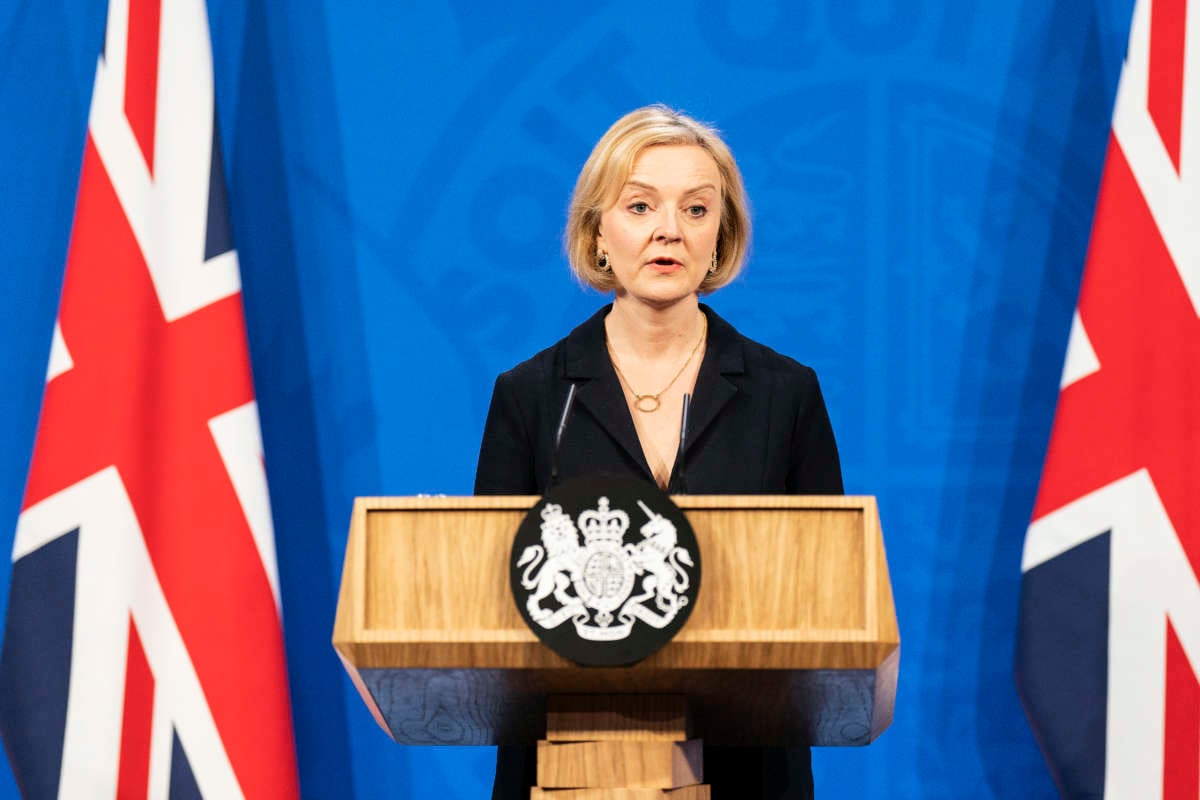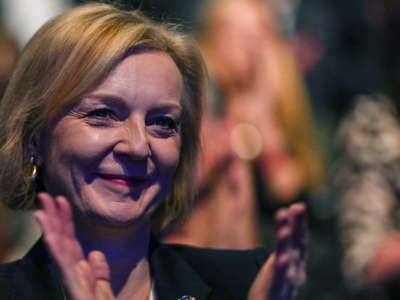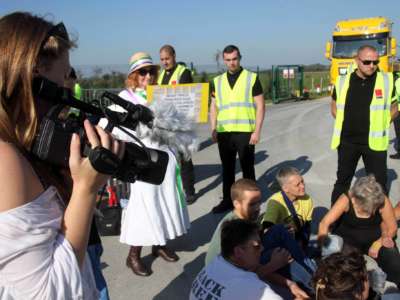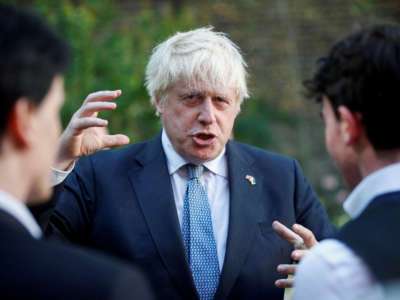
The U.K. government is in full meltdown. The new prime minister, selected by a vote of barely 140,000 Conservative Party members after Boris Johnson was forced out by his parliamentary colleagues back in early July, is on the ropes; she has fired her hapless chancellor, and the public is in full revolt against her party.
Since Brexit, the Conservative Party has had four leaders in quick succession: David Cameron, who made the losing bet that the “remain in Europe” side of the Brexit referendum would easily win; Theresa May; Boris Johnson and now Liz Truss. Not since the late 1950s and early 1960s has the Conservative Party run through so many prime ministers in quick succession.
As of Friday, Truss is still in charge, though her government is, practically by the minute, looking evermore shambolic. It’s entirely possible that enough of her members of Parliament (MPs) will revolt that she will have to announce a timeline for either leaving office or calling a general election.
In late September, Prime Minister Liz Truss — fresh off her victory in the Conservative Party’s internal leadership contest to replace disgraced Prime Minister Boris Johnson — and her chancellor, Kwasi Kwarteng, unveiled a sweeping, unfunded and inflation-fueling tax cut package. It promptly sent the U.K. financial markets and currency into a swan-dive and triggered a series of expensive emergency interventions by the Bank of England to keep the economy — and more specifically, the private pension system and mortgage market — afloat. Despite the chaos, both Truss and Kwarteng doubled down; they declared that the sweeping tax cuts were just the start of a massive program to downsize the government and jumpstart the sluggish economy. In response, large numbers of Conservative MPs made it clear they would vote down their government’s own economic program, and rumblings began in Parliament that Truss’s premiership was doomed.
The Economist magazine — hardly known for its firebrand left-wing rhetoric– lambasted Truss for having squandered her credibility within a week of taking office. That was, the magazine pointed out, “the shelf life of a lettuce.”
A few days after the initial market panic, public support for the Conservative Party had collapsed and economic hard-hitters from the International Monetary Fund (IMF) to Larry Summers were piling onto the U.K. government’s economic plans. Kwarteng was forced to reverse course and reinstate the top rate of income tax for the wealthiest 1 percent that he had scrapped, with such fanfare, just a few days earlier. It was, it seemed, amateur night in the halls of power in London. Truss, through her Downing Street office, nevertheless reiterated that she had full confidence in Kwarteng.
Only a day later, while Truss and Kwarteng were visiting a construction site in Birmingham, a hardhat-wearing Truss was twice asked by journalists whether she had confidence in her chancellor. This time around, however, she was more ambivalent. Twice, she ducked the question and refused to say whether she still had faith in Kwarteng. Twenty-four hours is, apparently, these days a very long time in British politics.
Ten days after that, with the financial panic in the U.K. showing precious few signs of abating, Kwarteng was forced to ditch meetings with the IMF in Washington, D.C., and fly back to London for urgent consultations with Truss. It was clear by then that the cutting of corporate taxes, another centerpiece of Kwarteng’s ill-fated “mini-budget,” would also have to be reversed.
By late Friday morning, only 38 days after she had appointed Kwarteng, Truss had fired the chancellor in whom she had expressed such full confidence earlier in the month. In the long annals of British political history, it’s hard to find another example of a chancellor — essentially the second-most important political figure in the country after the prime minister — with such a short and dismal tenure.
In fact, only one other modern-day chancellor, Iain Macleod, has had a shorter term in office, and his excuse, at least, redounds somewhat more to his credit. He wasn’t forced out by the sheer ineptitude and economy-crashing consequences of his actions. Instead, on July 20, 1970, a month after Prime Minister Edward Heath hired him, he died. To be fair, there are also three others, all from the early 19th century, who managed to serve even less time than did Kwarteng, but one wasn’t even a permanent chancellor: 188 years ago, Baron Denman eked out a month in office — but Denman wasn’t really the chancellor; he was only ever intended as a placeholder, announced as an interim chancellor appointed in a rush by incoming Prime Minister Sir Robert Peel until he could find a more permanent figure for the job.
In the wake of Truss’s firing of Kwarteng — who was made to take the fall for policies that were signed off on and, all evidence to the contrary notwithstanding, promoted as tonics to the U.K.’s financial system by Truss herself — the sense of political crisis has only intensified. The Financial Times, perhaps the ultimate paper of record in the U.K., ran an opinion piece on Friday afternoon titled “Truss becomes a zombie prime minister in record time.
A rather loud whispering campaign has already begun in which Conservative MPs tell journalists that Truss “cannot survive.” Increasingly, there is talk of changing internal Conservative Party rules to allow for another leadership contest just months after the one that toppled Johnson. And the British press is rife with rumors that a group of “senior” MPs are about to publicly call on Truss to step down.
There’s something almost macabre about the Truss premiership. If I were superstitious, I’d say she was cursed. Everything she touches turns sour. On September 6, Truss traveled north to Scotland to be formally asked by Queen Elizabeth to form a government. Two days later, the queen was dead. She tried to channel Margaret Thatcher in taking a hatchet to taxes and regulations, and the markets promptly gave her the Bronx cheer. She expressed her full confidence in Kwarteng and then had to fire him.
On the day she became prime minister, Truss gave a short statement outlining her ambitions. She was, she averred, “confident that together we can: Ride out the storm, we can rebuild our economy, and we can become the modern brilliant Britain that I know we can be.” Six weeks later, Truss’s ability to ride out her own personal storm looks, to say the least, rather dubious. Britain, long known for the stability of its political institutions, could well be on the way to its third prime minister in as many months.
We don’t have much time — can you help?
Please, do what you can to help us get through this trying time.
DONATE NOWCopyright © Truthout. May not be reprinted without permission.
Sasha Abramsky is a freelance journalist and a part-time lecturer at the University of California at Davis. His work has appeared in numerous publications, including The Nation, The Atlantic Monthly, New York Magazine, The Village Voice and Rolling Stone. He also writes a weekly political column. Originally from England, with a bachelor’s in politics, philosophy and economics from Oxford University and a master’s degree from the Columbia University Graduate School of Journalism, he now lives in Sacramento, California.

Liz Truss Is Roiling the British Economy in Her Zeal to Serve the 1 Percent
The U.K. prime minister had said the £45 billion giveaway to the rich was just the start. Then she was forced to U-turn.by Sasha Abramsky, Truthout

Liz Truss’s Overturn of Fracking Ban in the UK Is Sparking Grassroots Resistance
Anti-fracking organizers in Britain are planning blockades and say they’re ready to “pull out all the stops.”by Gareth Dale, Truthout

Britain’s Economic Unraveling May Be Boris Johnson’s Real Legacy
The combination of Brexit, the aftereffects of COVID-19 and the war in Ukraine has left the British economy weak.by Sasha Abramsky,
READING LIST
POLITICS & ELECTIONS
Don’t Let the “Red Ripple” Overshadow the Local-Level Progressive Victories
POLITICS & ELECTIONS
“Red Wave” Is Barely a Trickle, as Dems Outperform Expectations in Midterm Races
POLITICS & ELECTIONS
Summer Lee, Others Score Decisive Wins in Triumphant Night for Progressives
REPRODUCTIVE RIGHTS
Abortion Rights Win in Several Statewide Ballot Initiative Contests
POLITICS & ELECTIONS
The Right Did Worse Than Expected, But That Shouldn’t Satisfy Progressives
POLITICS & ELECTIONS
Voters Rebuked Trump’s Bid to Seed the US Political System With MAGA Loyalists
** Added by Shoah
